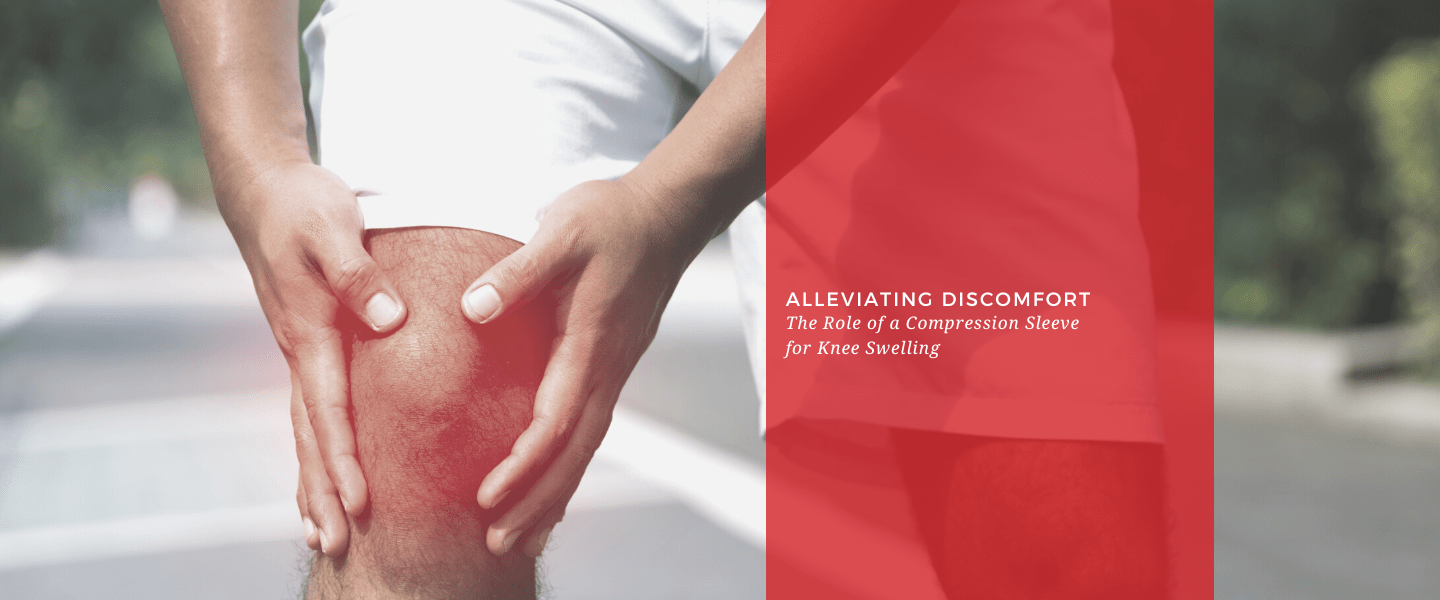With over 1 million orders

Alleviating Discomfort: The Role of a Compression Sleeve for Knee Swelling
Curious about how a compression sleeve can help with knee swelling? This article goes into the science and benefits behind compression garments, offering valuable insights for your knee health.
Swelling in the knee or edema, is a common issue that many people experience due to different reasons. Often it’s due to sustained injuries, degenerative conditions like osteoarthritis, or during the recovery period after surgery.

Addressing this swelling is important not just for pain management, but also to restore functional mobility of the knee. The role of compression sleeves for knee swelling is often overlooked, but it happens to be one of the most effective and easily accessible ways to address this condition.
Anatomy of Knee Swelling
The knee is a complex joint made up of bones, cartilage, ligaments, and synovial fluid. Swelling in the knee occurs when there is an excessive accumulation of fluid within the joint, which can be triggered by various factors such as physical trauma, inflammation, or underlying medical conditions. This build-up of fluid can restrict the normal range of motion in the knee, lead to discomfort or pain, and potentially slow down the healing process.
Compression Sleeve for Knee Swelling: How It Works
Compression sleeves are specially designed elastic garments that can be worn around the knee. The sleeves work by applying gentle, consistent pressure to the knee area. This pressure serves several important functions:

- Fluid Redistribution: The elastic material used to craft the sleeves apply even pressure to the knee, which is particularly beneficial for individuals dealing with swelling in the area. Because the swelling usually occurs due to an accumulation of excess fluid in the joint, the gentle compression from the sleeve helps in redistributing this fluid away from the affected area. This process reduces localized swelling, making it easier for individuals to move their knee more comfortably and efficiently.
- Enhanced Circulation: Another significant advantage of compression sleeves is their ability to improve blood circulation in the knee area. Proper blood flow is vital for the healing process. When the knee is injured or dealing with inflammation, adequate oxygen and essential nutrients which are required to promote healing are unable to reach the knee. Compression helps by ensuring that the affected region receives a sufficient blood supply. This also facilitates the removal of waste products and inflammatory substances, which can help alleviate pain and speed up the recovery process.
- Joint Stabilization: Knee injuries or surgical procedures can leave the joint vulnerable, and unnecessary movements can strain the healing tissues. Compression sleeves offer an added layer of support and stability to the joint. By minimizing excessive movements, compression sleeves help in reducing the risk of further injury and provide comfort as it heals. This stabilization can also be beneficial for individuals who engage in physical activities or sports, as it can reduce the risk of re-injury and improve performance.
- Pain Relief: In addition to the above benefits, compression sleeves can also help alleviate knee pain. The gentle pressure they deliver on the joint can have a soothing effect on the knee, making it more comfortable for individuals with various knee issues, including arthritis, tendonitis, or post-operative discomfort.
- Versatility: Compression knee sleeves are available in various sizes and designs, making them a versatile solution for people with different knee conditions. They can be worn during daily activities, exercise, or even while resting, depending on individual needs.
Empirical Evidence
Several studies have underscored the benefits of compression garments. A research study highlighted that athletes wearing compression garments reported reduced muscle soreness and improved recovery.
For knee-specific applications, there's anecdotal evidence from patients and medical practitioners alike who vouch for the benefits of compression sleeves, especially post-operatively and among osteo and rheumatoid arthritis patients. It's believed that the combined effect of reduced swelling, pain alleviation, and joint stabilization aids in quicker recovery and rehabilitation for post-op recovery, while the compressive effect helps manage chronic pain symptoms.
Practical Considerations When Using A Compression Sleeve for Knee Swelling
While compression sleeves offer a lot of advantages, they aren't a one-size-fits-all remedy. The level of compression, the material of the sleeve, and the duration for which it's worn can influence its effectiveness.
More importantly, the fit of the compression sleeve is very important if you want it to work. You need a sleeve provides ample and steady compression, but it should dig into your flesh so much that it cuts of circulation. Too big, and you won’t be getting any benefits from the sleeve, too small and you’re doing your knee more harm than good.

Additionally, individuals with certain medical conditions like peripheral artery disease or skin conditions should always consult a healthcare professional before using a compression sleeve.
That said, among all the non-invasive therapeutic tools available today, compression sleeves have proven to be very effective aids in managing knee swelling. By reducing edema, promoting blood flow, and stabilizing the joint, they effectively alleviate discomfort and accelerate recovery.
If you need a compression sleeve for knee swelling, be sure to browse through Dr. Arthritis' extensive selection of compression products and click the shop link below.
SHOP NOW
To learn more about about the benefits of compression sleeves, be sure to check out our other related articles below:
Stride with Confidence: Runners Knee Compression Sleeve Guide
Support on the Move: The Benefits of Compression Sleeves for Knees
